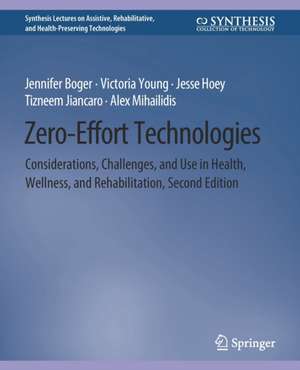Zero-Effort Technologies: Considerations, Challenges, and Use in Health, Wellness, and Rehabilitation, Second Edition: Synthesis Lectures on Technology and Health
Autor Jennifer Boger, Victoria Young, Jesse Hoey, Tizneem Jiancaro, Alex Mihailidisen Limba Engleză Paperback – 21 mar 2018
Din seria Synthesis Lectures on Technology and Health
-
 Preț: 392.60 lei
Preț: 392.60 lei -
 Preț: 318.07 lei
Preț: 318.07 lei - 20%
 Preț: 296.34 lei
Preț: 296.34 lei - 20%
 Preț: 419.25 lei
Preț: 419.25 lei - 20%
 Preț: 223.34 lei
Preț: 223.34 lei - 20%
 Preț: 331.08 lei
Preț: 331.08 lei - 20%
 Preț: 300.66 lei
Preț: 300.66 lei - 20%
 Preț: 226.64 lei
Preț: 226.64 lei - 20%
 Preț: 390.32 lei
Preț: 390.32 lei - 20%
 Preț: 326.97 lei
Preț: 326.97 lei - 20%
 Preț: 358.04 lei
Preț: 358.04 lei - 20%
 Preț: 328.60 lei
Preț: 328.60 lei - 20%
 Preț: 329.76 lei
Preț: 329.76 lei - 20%
 Preț: 298.64 lei
Preț: 298.64 lei - 20%
 Preț: 228.80 lei
Preț: 228.80 lei - 20%
 Preț: 269.03 lei
Preț: 269.03 lei - 20%
 Preț: 270.04 lei
Preț: 270.04 lei - 20%
 Preț: 329.26 lei
Preț: 329.26 lei - 20%
 Preț: 246.51 lei
Preț: 246.51 lei
Preț: 326.13 lei
Preț vechi: 407.66 lei
-20% Nou
Puncte Express: 489
Preț estimativ în valută:
62.40€ • 65.15$ • 51.65£
62.40€ • 65.15$ • 51.65£
Carte tipărită la comandă
Livrare economică 05-19 aprilie
Preluare comenzi: 021 569.72.76
Specificații
ISBN-13: 9783031004759
ISBN-10: 3031004752
Ilustrații: XIV, 118 p.
Dimensiuni: 191 x 235 mm
Greutate: 0.25 kg
Ediția:2
Editura: Springer International Publishing
Colecția Springer
Seriile Synthesis Lectures on Technology and Health, Synthesis Lectures on Assistive, Rehabilitative, and Health-Preserving Technologies
Locul publicării:Cham, Switzerland
ISBN-10: 3031004752
Ilustrații: XIV, 118 p.
Dimensiuni: 191 x 235 mm
Greutate: 0.25 kg
Ediția:2
Editura: Springer International Publishing
Colecția Springer
Seriile Synthesis Lectures on Technology and Health, Synthesis Lectures on Assistive, Rehabilitative, and Health-Preserving Technologies
Locul publicării:Cham, Switzerland
Cuprins
Preface.- Acknowledgements.- Overview.- Introduction to Zero-Effort Technologies.- Designing ZETs.- Building and Evaluatings ZETs.- Examples of ZETs.- Challenges and Future Directions.- Conclusions.- Bibliography.- Author Biographies.
Notă biografică
Dr. Jennifer Boger has been an active member in the field of intelligent assistive technology for enhancing safety and independence for older adults and people with disabilities for more than 15 years. She is the Schlegel Chair in Technology for Independent Living and an Assistant Professor in the Department of Systems Design Engineering at the University of Waterloo, with cross-appointments to the School of Public Health and Health Sciences, University of Waterloo and Affiliate Scientist at the Toronto Rehabilitation Institute. Jennifer's goal is to create innovative, accessible technologies that simultaneously enrich the experience of aging as well as society's perception of aging. She has published more than 50 peer-reviewed journals and conference contributions and is an active member of the rehabilitation engineering community
Dr. Victoria Young is a professional engineer specializing in systems and clinical engineering and has been conducting research for 14 years in the field of rehabilitation, specifically assistive and medical technologies. Her research largely focuses on examining how individuals with complex care needs, especially older adults, access medical care at home and in the community, and how technologies can be better integrated into this care process. She has published work that explores ways in which one might enhance the robustness of spoken dialogue-based systems within artificially intelligent, personal emergency response systems. She is also investigating how medical diagnostic services could be better coordinated to provide urgent care at home for high cost hospital users needing more timely access to medical care.
Dr. Jesse Hoey is an assistant professor in the David R. Cheriton School of Computer Science at the University of Waterloo. He is also an adjunct scientist at the Toronto Rehabilitation Institute in Toronto, Canada and an Honorary Research Fellow at the University of Dundee, Scotland. His research focuses on planning and acting in large-scale real-world uncertain domains. He has published over 30 peer-reviewed scientific papers in highly visible journals and conferences. He won the Microsoft/AAAI Distinguished Contribution Award at the 2009 IJCAI Workshop on Intelligent Systems for Assisted Cognition for his paper on technology to facilitate creative expression in persons with dementia. He won the Best Paper award at the International Conference on Vision Systems (ICVS) in 2007 for his paper describing an assistive system during hand washing for persons with dementia. Dr. Hoey is program chair of the 2011 British Machine Vision Conference (BMVC).
Dr. Tizneem Jiancaro is a design researcher and writer. Her primary interest lies in developing accessible mainstream technologies for people with cognitive impairments. She is also a keen advocate of empathy-based design practice, having written in depth on this topic. Her background includes a dual Ph.D. in Biomedical Engineering and Rehabilitation Science, and undergraduate degrees in Mechanical Engineering and Cognitive Science.
Dr. Alex Mihailidis is the Barbara G. Stymiest Research Chair in Rehabilitation Technology at the University of Toronto and Toronto Rehab Institute. He is a Professor in the Department of Occupational Science and Occupational Therapy and in the Institute of Biomaterials and Biomedical Engineering, with a cross appointment in the Department of Computer Science (all at the University of Toronto). He has been conducting research in the field of pervasive computing and intelligent systems in health for the past 15 years, having published over 150 journal papers, conference papers, and abstracts in this field. He has specifically focused on the development of intelligent home systems for elder care and wellness, technology for children with autism, and adaptive tools for nurses and clinical applications.
